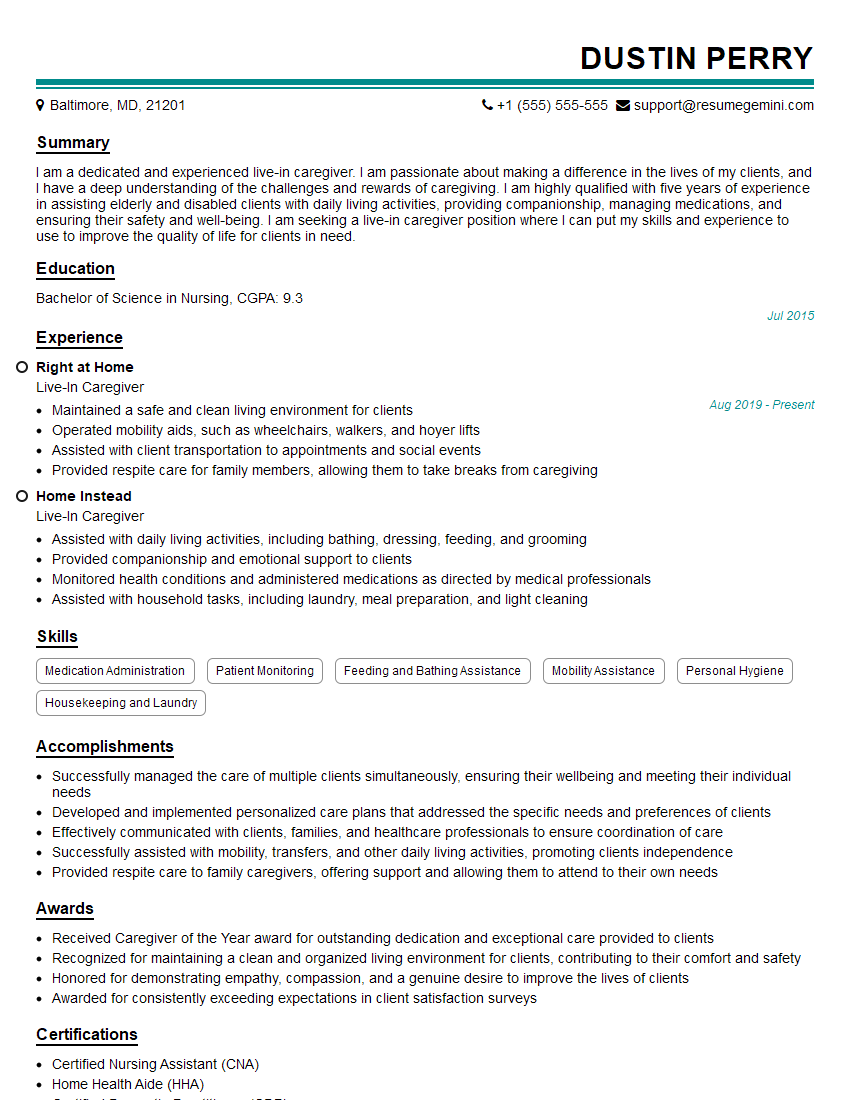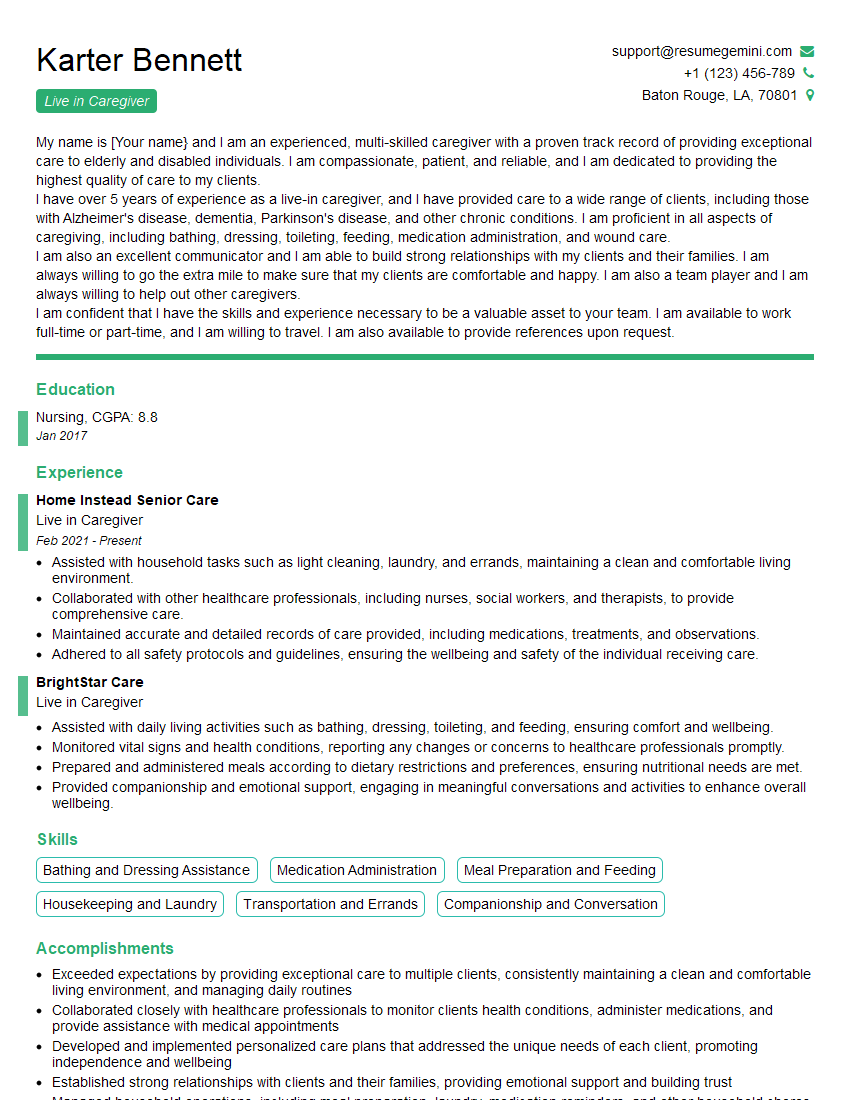Ever felt underprepared for that crucial job interview? Or perhaps you’ve landed the interview but struggled to articulate your skills and experiences effectively? Fear not! We’ve got you covered. In this blog post, we’re diving deep into the Live-In Caregiver interview questions that you’re most likely to encounter. But that’s not all. We’ll also provide expert insights into the key responsibilities of a Live-In Caregiver so you can tailor your answers to impress potential employers.
Acing the interview is crucial, but landing one requires a compelling resume that gets you noticed. Crafting a professional document that highlights your skills and experience is the first step toward interview success. ResumeGemini can help you build a standout resume that gets you called in for that dream job.
Essential Interview Questions For Live-In Caregiver
1. Tell us about your experience as a Live-In Caregiver?
- I have been working as a Live-In Caregiver for the past 5 years.
- I have experience in providing care to elderly patients with various needs, including Alzheimer’s disease, dementia, and Parkinson’s disease.
- My duties included providing personal care, such as bathing, dressing, and feeding, as well as companionship and emotional support.
2. What are the key skills required to be a successful Live-In Caregiver?
Compassion and Empathy
- It is important to be able to understand and relate to the needs of the patient.
- This involves being able to put yourself in their shoes and see things from their perspective.
Patience and Understanding
- Patients may be experiencing a variety of challenges, both physical and emotional.
- It is important to be patient and understanding with them, and to provide support and encouragement.
Communication Skills
- It is essential to be able to communicate effectively with the patient, as well as with family members and other healthcare professionals.
- This involves being able to listen attentively, ask questions, and provide clear and concise information.
Physical Stamina
- Live-in Caregivers are often required to perform physically demanding tasks, such as lifting and transferring patients.
- It is important to have physical stamina and strength.
Organizational Skills
- Live-in Caregivers are responsible for managing the patient’s care, which includes scheduling appointments, managing medications, and keeping track of finances.
- It is important to be organized and efficient in order to provide the best possible care.
3. What are some of the challenges you have faced as a Live-In Caregiver?
- One of the biggest challenges is dealing with the emotional toll of caring for someone who is ill or disabled.
- It can be difficult to see someone you care about struggling, and it can be emotionally draining to provide support and care.
- Another challenge is dealing with the physical demands of the job.
- Live-in Caregivers are often required to perform physically demanding tasks, such as lifting and transferring patients, which can be difficult and tiring.
4. What is your approach to providing care to patients with dementia?
- My approach to providing care to patients with dementia is to focus on their individual needs and abilities.
- I believe that it is important to create a safe and supportive environment for the patient, and to provide them with the opportunity to engage in activities that are meaningful to them.
- I also believe that it is important to support the family members of the patient, and to provide them with resources and information.
5. How do you handle difficult or aggressive patients?
- When dealing with difficult or aggressive patients, it is important to remain calm and respectful.
- I try to understand what is causing the patient to behave in this way, and I work to address their needs.
- I also use de-escalation techniques, such as speaking in a soft and soothing voice, and avoiding confrontational language.
6. What are your strengths as a Live-In Caregiver?
- My strengths as a Live-In Caregiver include my compassion, patience, and understanding.
- I am also a good listener and communicator, and I am able to build strong relationships with patients and their families.
- I am also physically strong and stamina, and I am able to perform the demanding tasks that are required of a Live-In Caregiver.
7. What are your weaknesses as a Live-In Caregiver?
- One of my weaknesses is that I can be too perfectionistic at times.
- I can also be too hard on myself when I make mistakes.
- I am working on improving in these areas, and I am confident that I can overcome these weaknesses.
8. What are your goals for your career as a Live-In Caregiver?
- My goals for my career as a Live-In Caregiver are to continue to provide the best possible care to my patients.
- I also want to continue to learn and grow as a professional, and to stay up-to-date on the latest advances in caregiving.
- I am also interested in becoming a certified dementia care specialist.
9. Why are you interested in working for our company?
- I am interested in working for your company because I am impressed with your commitment to providing quality care to patients.
- I believe that my skills and experience would be a valuable asset to your team.
- I am also eager to learn more about your company’s approach to caregiving, and to contribute to your mission of providing the best possible care to patients.
10. Do you have any questions for me?
I am interested in learning more about your company’s training program for new Live-In Caregivers.
Interviewers often ask about specific skills and experiences. With ResumeGemini‘s customizable templates, you can tailor your resume to showcase the skills most relevant to the position, making a powerful first impression. Also check out Resume Template specially tailored for Live-In Caregiver.
Career Expert Tips:
- Ace those interviews! Prepare effectively by reviewing the Top 50 Most Common Interview Questions on ResumeGemini.
- Navigate your job search with confidence! Explore a wide range of Career Tips on ResumeGemini. Learn about common challenges and recommendations to overcome them.
- Craft the perfect resume! Master the Art of Resume Writing with ResumeGemini’s guide. Showcase your unique qualifications and achievements effectively.
- Great Savings With New Year Deals and Discounts! In 2025, boost your job search and build your dream resume with ResumeGemini’s ATS optimized templates.
Researching the company and tailoring your answers is essential. Once you have a clear understanding of the Live-In Caregiver‘s requirements, you can use ResumeGemini to adjust your resume to perfectly match the job description.
Key Job Responsibilities
A Live-In Caregiver provides comprehensive support to individuals requiring assistance with daily living activities, medical care, and emotional well-being. Key responsibilities include:
1. Personal Care and Assistance
Assist with bathing, dressing, grooming, hygiene, and toileting needs.
- Maintain a clean and safe living environment.
- Assist with mobility and transportation.
2. Medical Care and Monitoring
Administer medications as directed by healthcare professionals.
- Monitor vital signs and report any changes to medical personnel.
- Assist with wound care and other medical tasks.
3. Emotional Support and Companionship
Provide emotional support and companionship.
- Engage in meaningful conversations and activities.
- Listen attentively and provide empathy.
4. Household Management and Meal Preparation
Assist with light housekeeping and laundry.
- Prepare and serve meals according to dietary guidelines.
- Maintain a clean and organized living space.
Interview Tips
Preparing for a Live-In Caregiver interview is crucial for success. Here are some tips to help you ace the interview:
1. Research the Company and Care Recipient
Learn about the company’s mission, values, and reputation. Research the care recipient’s condition and specific needs.
- This demonstrates your interest and commitment.
- It helps you tailor your responses to the specific requirements of the role.
2. Highlight Your Skills and Experience
Emphasize your relevant skills and experience in personal care, medical monitoring, emotional support, and household management.
- Use specific examples to demonstrate your abilities.
- Quantify your accomplishments whenever possible.
3. Showcase Your Compassion and Empathy
Live-In Caregivers must possess a compassionate and empathetic nature. Share examples of your caring and supportive interactions with previous clients.
- Describe how you built strong relationships with clients and their families.
- Emphasize your ability to provide emotional support in challenging situations.
4. Prepare for Behavioral Questions
Interviewers often ask behavioral questions to assess your problem-solving skills and approach to caregiving. Prepare for questions such as:
- Tell me about a time you handled a difficult situation with a client.
- How do you ensure the safety and well-being of your clients?
5. Practice Active Listening
Pay close attention to the interviewer’s questions and respond thoughtfully. Ask clarifying questions to show that you are engaged and understand the requirements of the role.
- Maintain eye contact and use body language that conveys interest and respect.
- Summarize the main points of the interviewer’s questions before answering.
Next Step:
Armed with this knowledge, you’re now well-equipped to tackle the Live-In Caregiver interview with confidence. Remember, preparation is key. So, start crafting your resume, highlighting your relevant skills and experiences. Don’t be afraid to tailor your application to each specific job posting. With the right approach and a bit of practice, you’ll be well on your way to landing your dream job. Build your resume now from scratch or optimize your existing resume with ResumeGemini. Wish you luck in your career journey!

